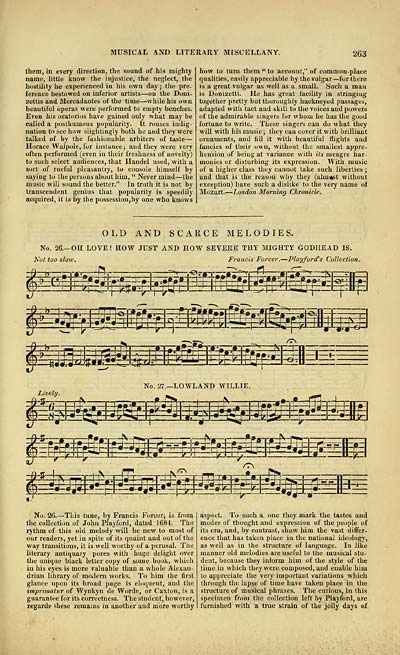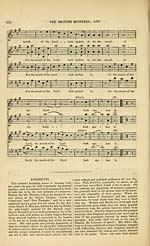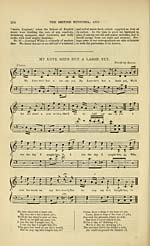Glen Collection of printed music > Printed music > British minstrel, and musical and literary miscellany
(601) Page 263 - Oh love! How just and how severe thy mighty godhead is
Download files
Complete book:
Individual page:
Thumbnail gallery: Grid view | List view

MUSICAL AND LITERARY xMISCELLANY.
263
them, in every direction, the sound of his mighty
name, little know the injustice, the neglect, the
hostility he experienced in his own day ; the pre-
ference bestowed on inferior artists — on the Doni-
zettis and Mercadantes of the time — while his own
beautiful operas were performed to empty benches.
Even his oratorios have gained only what may be
called a posthumous popularity. It rouses indig-
nation to see how slightingly both he and they were
talked of by the fashionable arbiters of taste —
Horace Walpole, for instance; and they were very
often performed (even in their freshness of novelty)
to such select audiences, that Handel used, with a
sort of rueful pleasantry, to console himself by
saying to the persons about him, " Never mind — the
music will sound the better." In truth it is not by
transcendent genius that popularity is speedily
acquired, it is by the possession,by one who knows
how to turn them " to account," of common-place
qualities, easily appreciable by the vulgar— for there
is a great vulgar as well as a small. Such a man
is Donizetti. He has great facility in stringing
together pretty but thoroughly hackneyed passages,
adapted with tact and skill to the voices and powers
of the admirable singers for whom he has the good
fortune to write. These singers can do what they
will with his music; they can cover it with brilliant
ornaments, and iill it with beautiful (lights and
fancies of their own, without the smallest appre-
hension of being at variance with its meagre har-
monies or disturbing its expression. With music
of a higher class they cannot take such liberties ;
and that is the reason why they (almi*st without
exception) have such a dislike to the very name of
Mozart. — London Mominy Chronicle,
OLD AND SCARCE MELODIES.
No. 26.-On LOVE! HOW JUST AND HOW SEVERE THY MIGHTY GODHEAD IS.
h'ot too slow. Francis Forcer.— -Playford's Collection.
Lively.
No. 27 .-LOWLAND WILLIE
^^^i^^^^pl^sgg
•-^-n— ,
:P^
p^i
- ^ ■1-r- ff :
^ipetfi
:!£±:
Sf
i^^
r^-
^— I n-
^^g^g^^^^ jiggi^^^^giig
No. 26. — Tliis tune, by Francis Forcer; is from
the collection of John Playford, dated 1684. The
rythm of this old melody will be new to most of
our readers, yet in spite of its quaint and out of the
way transitions, it is well worthy of a perusal. The
literary antiqimry pores with huge delight over
the unique black letter copy of some book, which
in his eyes is more valuable than a whole Alexan-
drian library of modern works. To him the first
glance upon its broad page is eloquent, and the
imprimatur of Wynkyn de Worde, or Caxton, is a
guarantee for its correctness. The student, however,
regards ihese remains in another and more worthy
aspect. To such a one they mark the tastes and
modes of thought and expression of the people of
its era, and, by contrast, show him the vast difl'er-
ence that has taken place in the national ideology,
as well as in the structure of language. In like
manner old melodies are useful to tlie musical stu-
dent, because they inform him of the style of the
time in which they were composed, and enable him
to appreciate the very important variations which
through the lapse of time have taken place in the
structure of musical phrases. The curious, in this
specimen from the collection left by Playford, are
furnished with a true strain of the jolly days of
263
them, in every direction, the sound of his mighty
name, little know the injustice, the neglect, the
hostility he experienced in his own day ; the pre-
ference bestowed on inferior artists — on the Doni-
zettis and Mercadantes of the time — while his own
beautiful operas were performed to empty benches.
Even his oratorios have gained only what may be
called a posthumous popularity. It rouses indig-
nation to see how slightingly both he and they were
talked of by the fashionable arbiters of taste —
Horace Walpole, for instance; and they were very
often performed (even in their freshness of novelty)
to such select audiences, that Handel used, with a
sort of rueful pleasantry, to console himself by
saying to the persons about him, " Never mind — the
music will sound the better." In truth it is not by
transcendent genius that popularity is speedily
acquired, it is by the possession,by one who knows
how to turn them " to account," of common-place
qualities, easily appreciable by the vulgar— for there
is a great vulgar as well as a small. Such a man
is Donizetti. He has great facility in stringing
together pretty but thoroughly hackneyed passages,
adapted with tact and skill to the voices and powers
of the admirable singers for whom he has the good
fortune to write. These singers can do what they
will with his music; they can cover it with brilliant
ornaments, and iill it with beautiful (lights and
fancies of their own, without the smallest appre-
hension of being at variance with its meagre har-
monies or disturbing its expression. With music
of a higher class they cannot take such liberties ;
and that is the reason why they (almi*st without
exception) have such a dislike to the very name of
Mozart. — London Mominy Chronicle,
OLD AND SCARCE MELODIES.
No. 26.-On LOVE! HOW JUST AND HOW SEVERE THY MIGHTY GODHEAD IS.
h'ot too slow. Francis Forcer.— -Playford's Collection.
Lively.
No. 27 .-LOWLAND WILLIE
^^^i^^^^pl^sgg
•-^-n— ,
:P^
p^i
- ^ ■1-r- ff :
^ipetfi
:!£±:
Sf
i^^
r^-
^— I n-
^^g^g^^^^ jiggi^^^^giig
No. 26. — Tliis tune, by Francis Forcer; is from
the collection of John Playford, dated 1684. The
rythm of this old melody will be new to most of
our readers, yet in spite of its quaint and out of the
way transitions, it is well worthy of a perusal. The
literary antiqimry pores with huge delight over
the unique black letter copy of some book, which
in his eyes is more valuable than a whole Alexan-
drian library of modern works. To him the first
glance upon its broad page is eloquent, and the
imprimatur of Wynkyn de Worde, or Caxton, is a
guarantee for its correctness. The student, however,
regards ihese remains in another and more worthy
aspect. To such a one they mark the tastes and
modes of thought and expression of the people of
its era, and, by contrast, show him the vast difl'er-
ence that has taken place in the national ideology,
as well as in the structure of language. In like
manner old melodies are useful to tlie musical stu-
dent, because they inform him of the style of the
time in which they were composed, and enable him
to appreciate the very important variations which
through the lapse of time have taken place in the
structure of musical phrases. The curious, in this
specimen from the collection left by Playford, are
furnished with a true strain of the jolly days of
Set display mode to: Large image | Transcription
Images and transcriptions on this page, including medium image downloads, may be used under the Creative Commons Attribution 4.0 International Licence unless otherwise stated. ![]()
| Special collections of printed music > Glen Collection of printed music > Printed music > British minstrel, and musical and literary miscellany > (601) Page 263 - Oh love! How just and how severe thy mighty godhead is |
|---|
| Permanent URL | https://digital.nls.uk/91442157 |
|---|---|
| Description | Also: Lowland Willie |
| Description | Scottish songs and music of the 18th and early 19th centuries, including music for the Highland bagpipe. These are selected items from the collection of John Glen (1833 to 1904). Also includes a few manuscripts, some treatises, and other books on the subject. |
|---|
| Description | The Glen Collection and the Inglis Collection represent mainly 18th and 19th century Scottish music, including Scottish songs. The collections of Berlioz and Verdi collected by bibliographer Cecil Hopkinson contain contemporary and later editions of the works of the two composers Berlioz and Verdi. |
|---|

